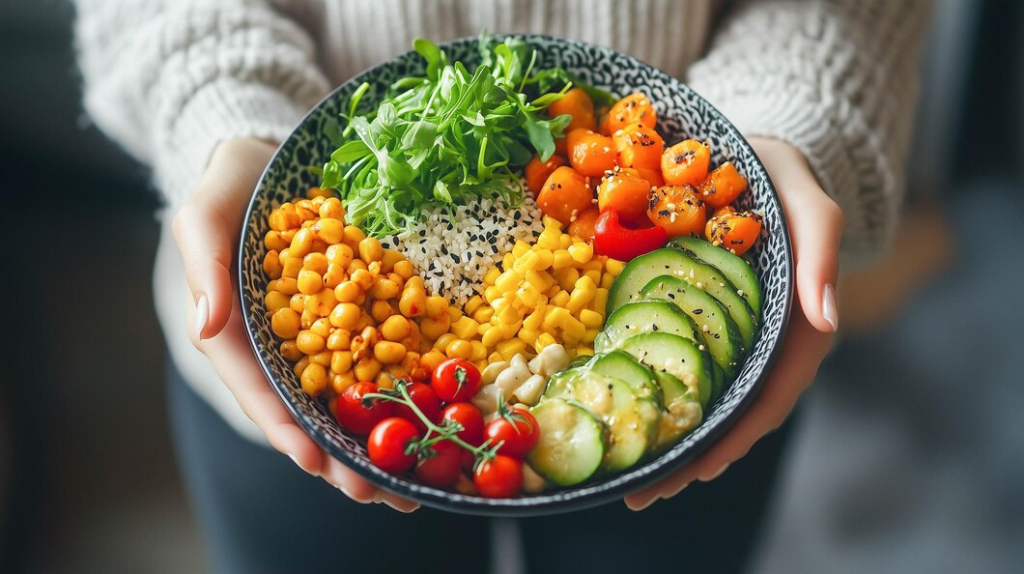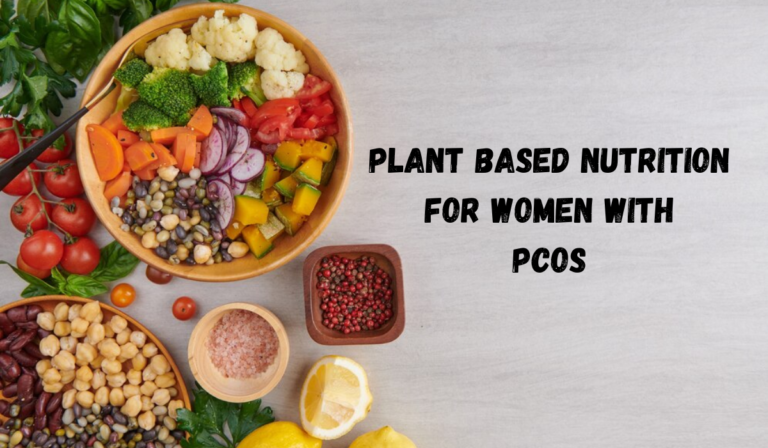Women with Polycystic Ovary Syndrome (PCOS) face many health issues including insulin resistance, weight gain, irregular menstrual cycle, hormonal balance, acne and more. To manage such symptoms, they need to make some lifestyle changes including their approach to diet. In this article, we will understand the importance of plant-based nutrition for women with PCOS.
Diet plays a significant role in managing your health, in this case, PCOS. Nutrition can directly impact hormone balance, insulin sensitivity, weight management, and overall well-being. Women with PCOS need to be particular about their dietary approach because it helps to regulate periods, balances your hormones, aids in weight management and has other multiple benefits as well. Plant-based nutrition for women with PCOS turned out to be an effective way to manage the condition.
Let us first understand the benefit of plant-based nutrition for women with PCOS
Benefits of plant-based nutrition for women with PCOS

Plant-based diets are effective for people as it supports the overall health and it combines various sources so you can get complete nutrition. For women with PCOS, a plant-based diet is critical as it has multiple health benefits and it majorly helps to manage the symptoms of PCOS. A plant-based diet prioritizes fruits, vegetables, legumes, whole grains, nuts, and seeds, and excludes or minimizes animal products. Here are the benefits of plant-based nutrition for women with PCOS:
Improving Insulin Sensitivity
Plant-based nutrition helps to improve insulin resistance of the body. Insulin resistance is one of the most common issues for women with PCOS. High levels of insulin in the bloodstream can trigger the ovaries to produce more androgens, which are responsible for the production of male hormones like testosterone. The production of male hormones worsens the symptoms of PCOS such as irregular periods, excess hair growth, and acne.
A plant-based diet is rich in fiber, antioxidants, and healthy fats which helps stabilize blood sugar and improve insulin sensitivity. It helps in reducing the negative effects of insulin resistance on the body preventing sudden spikes in your blood sugar levels.
Reducing Inflammation
Consuming a plant-based diet, rich in fiber, antioxidants, vitamins, minerals and essential macronutrients will help reduce inflammation in the body.
Women with PCOS often experience higher levels of inflammation. Such levels can worsen other symptoms of PCOS and contribute to metabolic complications.
Plant-based foods like fruits, vegetables, nuts, seeds, and whole grains are naturally anti-inflammatory, meaning they will help to reduce the inflammation in the body. These foods contain antioxidants and phytonutrients as well that help combat oxidative stress and promote a healthier hormonal environment.
Supporting Hormonal Balance
A well-planned plant-based diet can support hormone regulation by providing essential nutrients like vitamins, minerals, healthy fats, complex carbohydrates and protein. For instance, fiber-rich plant foods help eliminate excess hormones from the body, reducing androgen levels and promoting a more balanced hormonal profile. Plant-based diets are also typically lower in saturated fats and cholesterol, which can contribute to better overall hormone and cardiovascular health.
Promoting Weight Management
Women with PCOS often find it difficult to manage weight because of hormonal imbalance and insulin resistance. A plant-based diet can help women to manage both weight and their insulin resistance. Women with PCOS should opt for a plant-based diet which is low in calories and higher in fiber that can help in weight loss and management. Fiber helps to promote the feeling of fullness and reduces overall calorie intake. A plant-based diet also helps to improve metabolic health and reduce PCOS symptoms.
Heart Health Benefits
A plant-based diet which is usually low in unhealthy fats and cholesterol, both of which are risk factors for cardiovascular health, helps to improve and manage your cardiovascular health. Women with PCOS are at an increased risk of developing cardiovascular issues, including high blood pressure, high cholesterol, and heart disease. Foods like whole grains, legumes, and nuts which are a healthy source of fiber, protein, carbohydrates and healthy fats have been shown to improve heart health by lowering cholesterol levels, reducing blood pressure, and improving overall cardiovascular function.
Key Components of a Plant-Based PCOS Diet

What are the key components of a plant-based diet? Well, many have this notion that in a plant-based diet, you will have to choose fruits and vegetables again and again. Though fruits and vegetables make the majority of the plant-based diet for women with PCOS, you also have various other food sources. A plant-based PCOS diet emphasizes whole, nutrient-dense foods that support hormone balance, reduce inflammation, and improve insulin sensitivity. Here are the key components to focus on:
Fruits and Vegetables
Fruits and vegetables should form the foundation of a plant-based PCOS diet. They should make the majority of your PCOS diet as they are rich in essential vitamins, minerals, and antioxidants that help reduce inflammation, promote hormone health, and improve insulin sensitivity. You need to consume a variety of fruits and vegetables to maximize nutrient intake.
- Best Choices:
- Leafy greens (spinach, kale, Swiss chard)
- Cruciferous vegetables (broccoli, cauliflower, Brussels sprouts)
- Berries (blueberries, strawberries, raspberries)
- Citrus fruits (oranges, grapefruits)
- Sweet potatoes and squash
Whole Grains
Whole should be a part of plant-based diet for women with PCOS because they are a vital source of fiber and complex carbohydrates. Both of them are important for stabilizing blood sugar levels and improving insulin sensitivity. Whole grains provide slow-releasing energy that helps prevent blood sugar spikes and crashes.
- Best Choices:
- Quinoa
- Brown rice
- Oats
- Barley
- Buckwheat
- Farro
Legumes
Plant-based diets also include legumes, such as beans, lentils, and chickpeas, which are excellent plant-based protein. Legumes and lentils are also great sources that offer high levels of fiber and antioxidants ensuring you get enough fiber in PCOS and antioxidants help to manage oxidative stress and reduce inflammation. They help regulate blood sugar levels and provide a steady source of energy, making them ideal for women with PCOS.
- Best Choices:
- Lentils (red, green, brown)
- Chickpeas
- Black beans
- Kidney beans
- Peas
- Edamame
Nuts and Seeds
Nuts and seeds are a rich source of healthy fats, plant-based protein, and fiber. They are often considered a healthy snack and are also used as a combination with other health dishes. They are also rich in omega-3 fatty acids, which can reduce inflammation and support hormonal balance. You can incorporate a variety of nuts and seeds into your diet that can provide essential nutrients like magnesium, zinc, and vitamin E, all of which are beneficial for women with PCOS.
- Best Choices:
- Chia seeds
- Flaxseeds
- Walnuts
- Almonds
- Pumpkin seeds
- Sunflower seeds
Healthy Fats
Along with the other essential macronutrients, namely protein and carbohydrates, healthy fats should also be a part of your PCOS diet. Healthy fats are crucial for hormone production and regulation and make sure you consume natural foods that are rich in healthy fats. Plant-based sources of fats, particularly those rich in omega-3 fatty acids, can help reduce inflammation and support overall hormonal health. Each food source with healthy fats is essential to manage PCOS and ensure to consume particularly omega-3s for PCOS because it plays a key role in managing PCOS by improving insulin sensitivity and reducing androgen levels.
- Best Choices:
- Avocados
- Olive oil
- Coconut oil
- Flaxseed oil
- Walnuts
Foods to Limit or Avoid in a Plant-Based PCOS Diet

A plant-based diet for women with PCOS would include various food sources and offer multiple numerous benefits. For effective results, you need to eliminate some of the food from your plant-based PCOS diet so you can manage PCOS symptoms effectively.
Refined Carbohydrates and Sugary Foods
You need to eliminate refined carbs and sugary foods because they can cause rapid spikes in blood sugar levels, leading to increased insulin production and worsening PCOS symptoms. Try to avoid foods like white bread, pasta, pastries, and sugary drinks.
Processed Plant-Based Foods
Plant-based diet should include all the natural food sources and not processed sources. You need to eliminate processed plant-based foods from your PCOS diet. Foods like faux meats, packaged snacks, and sugary vegan treats, can be high in sodium, unhealthy fats, and refined sugars. Focus on whole, minimally processed plant foods for the best results.
Excessive Caffeine and Alcohol
For women with PCOS, both caffeine and alcohol can interfere with hormone balance and exacerbate symptoms like anxiety, sleep disturbances, and mood swings. Limiting intake of coffee, energy drinks, and alcoholic beverages can help support hormonal health. Alcohol also contributes to weight gain, so when choosing your diet, make sure you make the right choices.
Practical Meal Ideas for a Plant-Based PCOS Diet
With multiple plant-based PCOS-friendly ingredients you can prepare yourself healthy meals. Here are some simple, delicious meal ideas to help you incorporate plant-based foods into your PCOS management plan:
- Breakfast:
- Prepare overnight soaked oats with chia seeds, almond milk, and fresh berries for your breakfast.
- You can have a healthy green smoothie with spinach, banana, flaxseeds, and almond butter for your breakfast
- Have avocado toast on whole-grain bread with pumpkin seeds for your breakfast.
- Lunch:
- Prepare quinoa salad with chickpeas, cucumbers, cherry tomatoes, and olive oil dressing for your lunch.
- Make lentil soup and have it with a side of mixed greens and sunflower seeds in your lunch.
- Eat a brown rice bowl with steamed broccoli, tofu, and sesame oil in your lunch.
- Dinner:
- Stir-fry tempeh and enjoy it with bok choy, bell peppers, and brown rice for dinner.
- Make black bean tacos with avocado, salsa, and a side of mixed greens for your dinner.
- Eat roasted sweet potatoes with kale, tahini dressing, and quinoa for dinner.
- Snacks:
- Eat apple slices with almond butter as your mid morning snack.
- Have a handful of walnuts or mixed nuts and snack on them.
- You can have carrot sticks with hummus as a healthy snack option.
Supplements to Consider
A well-planned plant-based diet is rich in nutrients which can help you manage the symptoms of PCOS. But sometimes, the deficiency of one or another nutrient is underlying, especially those that we majorly get from animal-sources of food. To deal with any nutrient deficiency you can opt for supplements that are beneficial for you:
- Omega-3 Supplements: Omega-3 for PCOS is crucial because it helps to reduce inflammation and improve insulin sensitivity. Make sure to consume plant-based omega-3 supplements, such as algae oil, to get adequate intake of essential fatty acids.
- Vitamin B12: Since vitamin B12 is primarily found in animal products, women on a plant-based diet may need to take a B12 supplement to avoid deficiency.
- Vitamin D: Many women with PCOS have low vitamin D levels primarily found in dairy, which can worsen insulin resistance. A vitamin D supplement can help support hormone balance and overall health.
- Iron: Women on a plant-based diet may need to monitor their iron levels, as plant-based sources of iron are less easily absorbed by the body. Iron supplements can be helpful if needed.
Frequently Asked Questions
Is a plant-based diet good for PCOS?
Ans. Yes, a plant-based diet is good for women with PCOS because they offer an array of health benefits. A plant-based diet is rich in fiber, antioxidants, vitamins and minerals along with other macronutrients which helps to manage the symptoms of PCOS.
Can I eat non-veg if I have PCOS?
Ans. Yes, you can eat non-veg even if you have PCOS. Animal food sources provide nutrients like omega-3 fatty acids, protein, vitamin B12 which are essential to manage PCOS symptoms. Make sure to choose the right animal-products and execute them appropriately in your PCOS-friendly diet. You can also consult a dietician to get a well-planned PCO-friendly diet.
Are leafy vegetables good for PCOS?
Ans. Yes, leafy vegetables are good for women with PCOS because they are a source of vitamins and minerals. Include leafy green vegetables like kale, spinach, broccoli etc in your diet.




